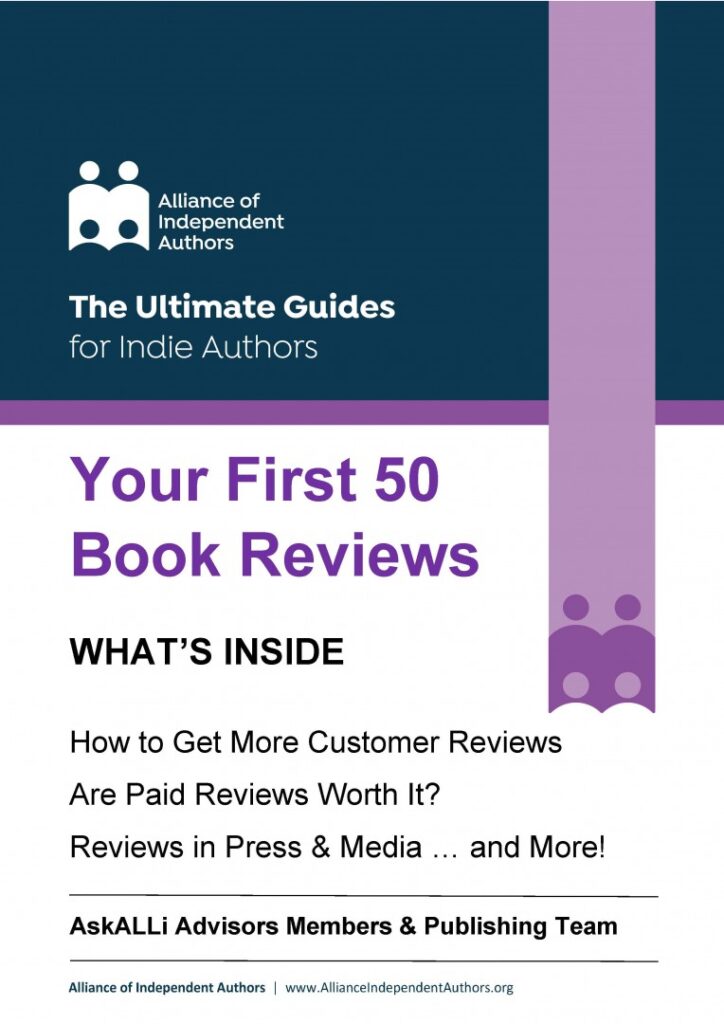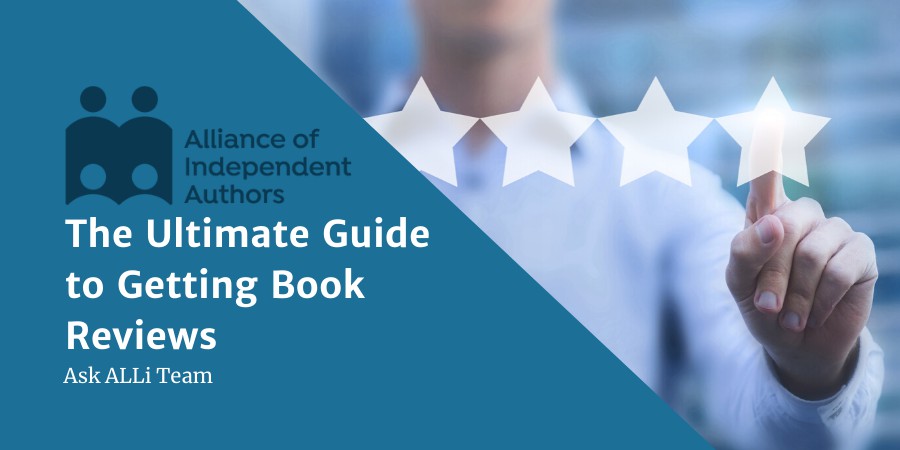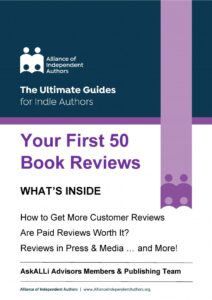 Arguably, when you publish a new book, gaining reviews is a key book-marketing activity; possibly the most important of all marketing tasks. But it's hard, and the rules about what you can and can't do constantly change. ALLi’s latest Ultimate Guide to Getting Book Reviews focusses on how to get your book's first 50 reviews (available for sale on the ALLi bookshop or free to members in the Member Zone: log in –>go to Books –>Ultimate Guides).
Arguably, when you publish a new book, gaining reviews is a key book-marketing activity; possibly the most important of all marketing tasks. But it's hard, and the rules about what you can and can't do constantly change. ALLi’s latest Ultimate Guide to Getting Book Reviews focusses on how to get your book's first 50 reviews (available for sale on the ALLi bookshop or free to members in the Member Zone: log in –>go to Books –>Ultimate Guides).
In this post, we cover:
- The different types of review
- How to get reviews and editorial reviews
- How to make the most out of your reviews
- How to deal with negative reviews
Ultimate Guide to Getting Book Reviews: Main Types of Review
There are many different kinds of book reviews and publications, each one having evolved separately from one another for different purposes and different kinds of audiences.
1. Reviews in mass media
Mass media reviews in newspapers and magazines were traditionally the only way to let people know about books and are still highly influential, especially the Review sections of major publications like the New York Times, The Guardian, for example. Also influential are radio and TV book review and interview programs, like the Oprah or Richard and Judy book clubs.
2. Reviews in book trade publications
People connected with the publishing industry read book trade publications. Publishers, agents, booksellers, librarians, marketing agencies, and book reviewers all read publications and associated websites like Publishers Weekly, Foreword Reviews, Kirkus Reviews, and Library Journal, among others.
3. Reviews by book bloggers
Book bloggers are avid readers who have developed often significant online followers. They can be very influential in creating fan buzz about books.
4. Reviews by readers given an advance copy for review
Advanced Reader Copy shortened to “ARCs,” describes the process of providing a copy of your book, prior to publishing, to a select group of readers with a request that they write a review once you publish. A
5. Online customer reviews
Customer reviews appear on a book’s sales page on online retailers. Readers who have purchased a book, or who might have received advance copies of the book, write online customer reviews. Reviews on sites such as Amazon, Goodreads, and Audible can be very influential. A reader can, on the spur of the moment, choose to buy or not to buy a book based on online customer reviews.
There are many good reasons why online book reviews have become front of mind:
• Research indicates they influence readers’ decisions to buy.
• They are public and perpetual: posted for all the world to see and they don’t go away (unless the online retailer decides to remove them.)
• They are relatively accessible and democratic—anyone with an account for a particular online retail store, or with their own blog, may post a review.
• More online reviews equals greater visibility within online stores and on search engines.
6. Editorial reviews (paid and unpaid)
Let’s clarify what we’re talking about when we say “editorial reviews.” Editorial reviews, also called endorsements, are those glowing comments you find on front covers, back covers, inside in the front matter, and on your book’s page with the distributor/retailer (e.g. Amazon). These endorsements are often from people working for big-brand media outlets (New York Times Books Review, The Guardian Review); other famous, notable or clued-in authors, or others who have lots of credibility with your target reader.
Authors, both indie and traditional, can pay for editorial reviews–though you don't have to, you can also put the leg work in to build your network and reach out to influencers. It very much depends on your budget. If money is tight, there are more effective things you can do for booksales. But if time is tight and you have the money, paying for an independent review on one or more of the editorial review sites gives your book a start.
Among the most reputable fee-for-review services are ALLi Partner Members Foreword's Clarion Reviews, BlueInk, Kirkus Indie Reviews, and Publishers Weekly’s BookLife.
As with every other aspect of publishing (and indeed of life) there are disreputable review services out there. For more on this, connect with ALLi Watchdog Desk. Sign into the allianceindependentauthors.org and then navigate to SERVICES > WATCHDOG DESK.
Ultimate Guide to Getting Book Reviews: The Principles
Depending on the type of review you're after, the principles of reach-out to reviewers are generally the same: research, well-structured pitch,
Principle 1: Research
For advance reviews, customer or blogger reviews:
- Make sure the people you're contacting do actually post reviews regularly. Are there reviews on their social media? Photos of books? Shout outs to authors?
- Check they review in the same genre your book is in
- Search for their name and contact details. Reviewers with websites often have quirky titles like: Books and Coffee or I Love Books.com. These regular reviewers often get swamped with requests. Most requesters won't bother searching for their name and reach out with something like this: Hey, Books and Coffee, I'm the author of… will you review my book. That's not going to work. Take the time out to find their name on their about page or social media and you're way more likely to get a response when you email them. And take time to craft a pitch that explains to them why your book is a fit for them.
Principle 2: Create a Template Email
The structure of a good endorsement review email (or letter or social media message if you are reaching out via a method other than email) goes like this:
- subject line
- intro tailored paragraph (Hi Mr. Tom Hanks, I know you have a keen interest in World War II history and I think you’ll be interested in a book I’ve just written titled [title]. I’m hoping you’ll agree to provide a review.)
- what the book is about – this can be a modification of your blurb
- links where they can access their ARC (advance review copy). Consider using a service like Prolific Works or BookFunnel and consider providing two options: an excerpt with a few sample chapters and the full manuscript. If you also have a website or webpage provide that link as well.
- your requested deadline – this should be at least four weeks, and six to eight is probably better.
- a line explaining that reviews received before the deadline will be considered for front or back cover treatment, and, acknowledging they are busy and that you’ll gladly accept their review even if they are unable to meet your deadline.
- Some authors will attach their book cover too.
- Sign off thanking them for their time
Principle 3: Be Organized
Find a method to organize the information you've collected about potential reviewers however suits you: word, excel, something more fancy like Trello or Asana. You'll want columns for name, company, email address, social media handles, mailing address, which book(s) they’ve reviewed, and a column or space to add notes about your communication. Like, when they tell you they’ll be happy to provide editorial reviews for your self-published book, and they’ll get back to you in two weeks.
Ultimate Guide to Getting Book Reviews: Influencer and Editorial Reviews
If you want review, blurb or praise quote from influencers or any kind of influential review e.g. in a mass-media newspaper or review outlet, here are some tips:
- Leave a longer amount of time for contacting potential influencers. They have busy schedules and will likely need a longer period of time to review the book.
- Make sure they do review books. You can always check their website to see if they have a no review policy. Also check that they review in your genre.
- If you write nonfiction, you'll need to research influencers and leaders in your sector. Make sure whoever you're asking to review is actually relevant. Also if you've quoted an influencer in your book, consider asking them to review it. Most people are honored when they're quoted, so this is a great way in.
- Expect a lot of no's. Influencers are busy people and will often get asked to review or praise dozens of books a week. You are not going to get 100 % yeses, but likewise, you're unlikely to get 100% nos. But when you purposefully go out and ask for editorial reviews for self-published books, good things happen. You might get an invitation to write a guest blog on a high-traffic blog site, or to be a guest on a podcast, or something else you already had on your book marketing to-do list anyway. It’s a win-win.
- Resist the temptation to follow up with them, except perhaps once if you haven’t heard within two to three weeks. Be polite, don’t badger, never make them feel like you assume they have an obligation to do anything. A simple outreach to tell them you’re just checking to be sure they received your original message, and that’s it.
The Ultimate Guide to Getting Book Reviews: How to Get Reviews
We've already mentioned the better paid review outlets: Foreword's Clarion Reviews, BlueInk, Kirkus Indie Reviews, and Publishers Weekly’s BookLife.
Do a Google for ‘book review bloggers‘ you'll get pages of listing and reviewers. These listings are fabulous, yes. But to actually get the reviews, you're going to have to do the work and pitch the reviewers.
Search for Book Reviewer Listings: such as this huge list of review sites from Reedsy. Or what about this one from Dave Chesson at Kindlepreneur. Check out the list by genre. One more: Top 100 Book Review blogs
Free Downloads: Over time, doing selective giveaways will increase the amount of reviews you get. Estimates reckon that for every 100 completed reads, .06 people will review. Not even one. Tough stats. Giving away copies to the right people (not willy nilly) and asking for an independent review in return will help.
Newsletter swaps: If you have a mailing list you have the ability to swap recommendations in your emails with other authors. Your mileage may vary, and always make sure the person you're asking to read and review your book is reputable and trustworthy.
Ask on social media: If someone tells you they've read your book, politely ask if they would leave a short review. You may find this uncomfortable, but it works.
Schedule messages, memes and posts: how many times have you posted on your Facebook page or instagram story asking for reviews? If you feel uncomfortable ask indirectly. Put up memes about how much they mean to an author, or how important they are in general rather than asking directly, though the latter works better! Point is, schedule a reminder in once a week for the next year and I bet you see a huge increase in reviews.
#Bookstagram: Bookstagram is a movement on Instagram uniting all book reviewers and social media users. Typically a Bookstagrammer will post a gorgeous picture of your book and / or leave reviews. Some double up as book review bloggers. This is a time-intensive method of getting reviews, but it does pay off as you often get stunning photos of your books in the process. And if you ask whether you can repost them or use them, they'll often say yes.
To find bookstagrammers:
- Go to Instagram
- Search for #bookstagram #booklover and or any other variation of ‘book' something in the search bar.
- Go to each profile, and check if they have an 'email me' button OR a link to their website on their bio. If they do, bingo!
The Ultimate Guide to Getting Book Reviews: What if You Get a Negative Review?

Negative reviews – we will all get them at some point, no matter how great we think our books are. Indeed, some writers even see it as a badge of honor to get a savage 1*, because it demonstrates to the world that your reviews aren’t all from your friends. But that doesn’t stop it hurting, at least for a little while – especially if the reason for the review feels unfair.
Don't respond. Ever. Professionals don't get into public spats about things that are opinions. You'll come off looking worse and only antagonist the reviewer. walk away, get a cup of coffee, and move on with the more important things in your day (which is everything else).
Put a positive spin on it. If you've received a number of reviews all saying the same thing, such as: needed more worldbuilding. use it as a learning opportunity to develop your craft. It's a gift really, to be told where to direct your attention so you can focus your development in the right areas.
If you're getting predominantly one-star reviews, then you've either marketed to the wrong genre or the quality of your book isn't what it should be.
Remember reviews aren't for authors, they're for readers. Though it's nice to see praise of our work, reviews aren't for the author. Reviews are there to help other customers decide whether or not they would like to purchase your book. Don't be afraid of bad reviews either. If someone wrote, “didn't like it, far too Steampunk heavy” don't worry. That's going to be a steampunk lover's dream. So just as much as you might lose one reader, bad reviews help other readers buy books. If they’re a serious potential customer for your book, they won’t be put off by the odd crazy, and they’ll be smart enough to realize which reviews are credible.
Ultimately, if reading reviews—be they positive or negative— affects you or your mental health or your motivation to write in any way, then you should probably stop reading them. Lots of authors do this. The alternative response–if you can do it–is to read, learn if there's any learning in it, then forget about it. This means treating the good reviews as dispassionately as you treat the bad.
The Ultimate Guide to Getting Book Reviews: How to USE Your Reviews
Once you've got reviews, use them! So many writers secure a review and then do nothing with it. If you've managed to get ARC reviews or reviews from influencers, use them.
Great one-liners also lend themselves well to:
- Endorsement quotes for your book covers. Have your designer add the quotes to the cover.
- “What Readers Say” pages at the start of your books. Go to a bookstore and have a look inside the cover of a few books to see how these are styled and laid out and how many quotes you might need.
- Information sheets for booksellers if you're trying to sell selective rights.
- Social media graphics for potential new customers. Here's one I've created for an upcoming release:

I used Canva to create the graphic and the elements in my book cover to create the background and colour scheme. Canva is a free program and you can upload your own book cover images to their site.
Two Notes of Caution
If you are in any doubt that any reviewer may not be happy to see you share their review, then ask permission first. This particularly applies to bookbloggers, who are reviewing in their own space and under their own copyright – unlike Amazon reviewers, which Amazon actively encourages you to share (though reviewers may not realise this). Alienating a bookblogger by violating their copyright is a bad idea, especially if you are hoping they will review your future books.
- If quoting an extract rather than the full review, the conventional – and ethical – practice is to indicate what you’ve omitted with an ellipsis […] to show that you’re quoting out of context, and alerts the reader to check the rest of the review, which may not be so flattering, if they wish to. (Most won’t.)
 DON'T FORGET
DON'T FORGET
How To Get Your First 50 Book Reviews: The Guidebook
Our Quick & Easy Guide to getting reviews is based on the experience of ALLi members and on ALLi’s Ethical Author policy.
ALLi’s latest Quick & Easy Guidebook focusses on how to get your first 50 book reviews (available for sale on the ALLi bookshop or free to members in the Member Zone: log in –>go to Advice –>Quick & Easy Guides). This is the ultimate guide to getting book reviews.


 DON'T FORGET
DON'T FORGET


I did pay for membership. I may have used a different email: [email protected] or [email protected]
I gave my copy of my membership to my husband, the hoarder in chief and tax accountant. We live in PR. It is cold here now.
That means I can wear long pants.
Donna S. Cohen RN newest book: A Nurse’s Guide to Plastic Surgery—Loving Yourself While Loving Your Wallet.
I would like someone else to handle the marketing!!!!
Very comprehensive and well done article on how to get your book reviewed. Thank you.
Team Golfwell are retired people in New Zealand and they do free book reviews > https://www.teamgolfwell.com/free-book-reviews.html